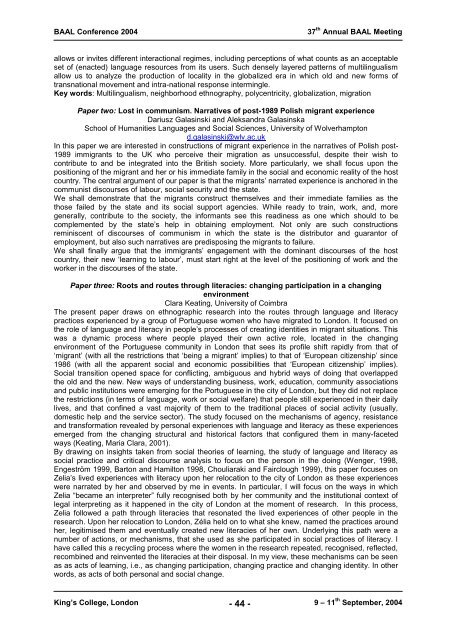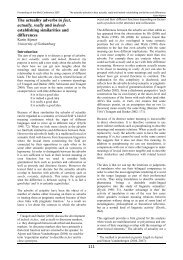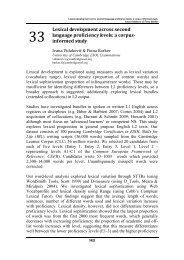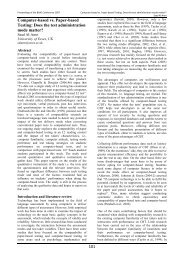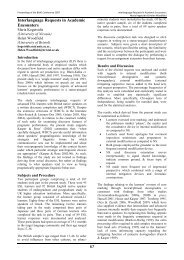Colloquia - British Association for Applied Linguistics
Colloquia - British Association for Applied Linguistics
Colloquia - British Association for Applied Linguistics
Create successful ePaper yourself
Turn your PDF publications into a flip-book with our unique Google optimized e-Paper software.
BAAL Conference 2004 37 th Annual BAAL Meeting<br />
allows or invites different interactional regimes, including perceptions of what counts as an acceptable<br />
set of (enacted) language resources from its users. Such densely layered patterns of multilingualism<br />
allow us to analyze the production of locality in the globalized era in which old and new <strong>for</strong>ms of<br />
transnational movement and intra-national response intermingle.<br />
Key words: Multilingualism, neighborhood ethnography, polycentricity, globalization, migration<br />
Paper two: Lost in communism. Narratives of post-1989 Polish migrant experience<br />
Dariusz Galasinski and Aleksandra Galasinska<br />
School of Humanities Languages and Social Sciences, University of Wolverhampton<br />
d.galasinski@wlv.ac.uk<br />
In this paper we are interested in constructions of migrant experience in the narratives of Polish post-<br />
1989 immigrants to the UK who perceive their migration as unsuccessful, despite their wish to<br />
contribute to and be integrated into the <strong>British</strong> society. More particularly, we shall focus upon the<br />
positioning of the migrant and her or his immediate family in the social and economic reality of the host<br />
country. The central argument of our paper is that the migrants‟ narrated experience is anchored in the<br />
communist discourses of labour, social security and the state.<br />
We shall demonstrate that the migrants construct themselves and their immediate families as the<br />
those failed by the state and its social support agencies. While ready to train, work, and, more<br />
generally, contribute to the society, the in<strong>for</strong>mants see this readiness as one which should to be<br />
complemented by the state‟s help in obtaining employment. Not only are such constructions<br />
reminiscent of discourses of communism in which the state is the distributor and guarantor of<br />
employment, but also such narratives are predisposing the migrants to failure.<br />
We shall finally argue that the immigrants‟ engagement with the dominant discourses of the host<br />
country, their new „learning to labour‟, must start right at the level of the positioning of work and the<br />
worker in the discourses of the state.<br />
Paper three: Roots and routes through literacies: changing participation in a changing<br />
environment<br />
Clara Keating, University of Coimbra<br />
The present paper draws on ethnographic research into the routes through language and literacy<br />
practices experienced by a group of Portuguese women who have migrated to London. It focused on<br />
the role of language and literacy in people‟s processes of creating identities in migrant situations. This<br />
was a dynamic process where people played their own active role, located in the changing<br />
environment of the Portuguese community in London that sees its profile shift rapidly from that of<br />
„migrant‟ (with all the restrictions that „being a migrant‟ implies) to that of „European citizenship‟ since<br />
1986 (with all the apparent social and economic possibilities that „European citizenship‟ implies).<br />
Social transition opened space <strong>for</strong> conflicting, ambiguous and hybrid ways of doing that overlapped<br />
the old and the new. New ways of understanding business, work, education, community associations<br />
and public institutions were emerging <strong>for</strong> the Portuguese in the city of London, but they did not replace<br />
the restrictions (in terms of language, work or social welfare) that people still experienced in their daily<br />
lives, and that confined a vast majority of them to the traditional places of social activity (usually,<br />
domestic help and the service sector). The study focused on the mechanisms of agency, resistance<br />
and trans<strong>for</strong>mation revealed by personal experiences with language and literacy as these experiences<br />
emerged from the changing structural and historical factors that configured them in many-faceted<br />
ways (Keating, Maria Clara, 2001).<br />
By drawing on insights taken from social theories of learning, the study of language and literacy as<br />
social practice and critical discourse analysis to focus on the person in the doing (Wenger, 1998,<br />
Engeström 1999, Barton and Hamilton 1998, Chouliaraki and Fairclough 1999), this paper focuses on<br />
Zelia‟s lived experiences with literacy upon her relocation to the city of London as these experiences<br />
were narrated by her and observed by me in events. In particular, I will focus on the ways in which<br />
Zelia “became an interpreter” fully recognised both by her community and the institutional context of<br />
legal interpreting as it happened in the city of London at the moment of research. In this process,<br />
Zelia followed a path through literacies that resonated the lived experiences of other people in the<br />
research. Upon her relocation to London, Zélia held on to what she knew, named the practices around<br />
her, legitimised them and eventually created new literacies of her own. Underlying this path were a<br />
number of actions, or mechanisms, that she used as she participated in social practices of literacy. I<br />
have called this a recycling process where the women in the research repeated, recognised, reflected,<br />
recombined and reinvented the literacies at their disposal. In my view, these mechanisms can be seen<br />
as as acts of learning, i.e., as changing participation, changing practice and changing identity. In other<br />
words, as acts of both personal and social change.<br />
King‟s College, London 9 – 11 th - 44 -<br />
September, 2004


